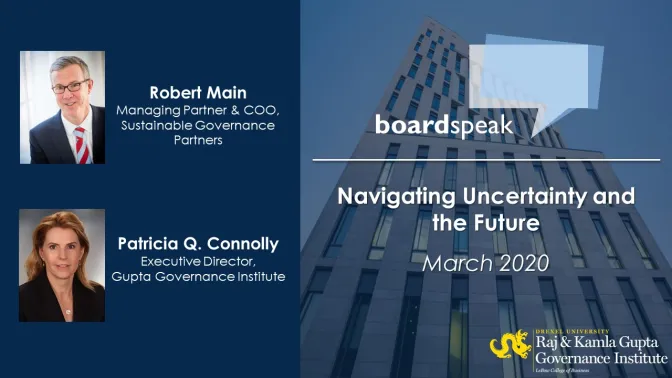
The Powerful Role Boards Play on ESG Issues
The role of public companies in ESG matters is evolving—and often debated. Tanuja Dehne, a Senior Advisor with The B Team, has been actively engaged in how public companies can integrate sustainability issues into their strategy. Through her governance experience as a director for three public companies, as well as her involvement with numerous nonprofit boards, Tanuja is focusing on the powerful role that boards serve on environmental, social and governance issues for their organizations and its stakeholders. Executive Director of the Gupta Governance Institute, Patricia Connolly, spoke with Tanuja about her work with The B Team, how ESG is driving technology, and how boards and governance can prioritize sustainability efforts.
Patricia Connolly: Tanuja, could you provide some background on The B Team and how you got involved with this organization?
Tanuja Dehne: The B Team is a global partnership of business and civil society leaders working together to catalyze a better way of doing business for the wellbeing of people and the planet. We aim to use the influence of our leaders to ensure that business becomes a driving force for good. The world’s natural resources are being exhausted at an unsustainable rate due to rapid production and consumption globally. Simply put—if we continue to use our natural resources as we currently do, they will run out. The intention of The B Team is to demonstrate that a more sustainable, equitable path can be better for both business and society, and show how we can leverage business to create that sustainable future.
“Corporate governance can be powerful catalyst for climate action.”
I became involved with The B Team and it’s “Net-Zero by 2050” program over two years ago. I proposed a new focus on boards of directors to advance the program’s goal of reducing net greenhouse gas emission to zero by 2050. Boards have the power to impact and influence positive change. As the highest decision-making authority of an organization, boards are in a unique position to help shape strategy and empower management teams to execute that strategy in service of long-term value creation for shareholders and other stakeholders including employees, the communities in which they operate, customers and partners. My background as a corporate secretary, executive at an energy company and director on public companies led me to develop a strong interest in how boards can set the tone at the top and integrate ESG matters into the board’s work, starting with long-term strategic planning. Based on my observations in and around the boardroom, corporate governance can be a powerful catalyst for climate action.
Connolly: What influence has The B Team had on governance?
Dehne: The B Team leverages the unique platforms of its Leaders (both corporate and civil society) to bring others along in a purpose driven movement to change the way we do business. We have a courageous team of Leaders whose reach extends globally, and we utilize that network to facilitate peer-to-peer discussion and interaction among directors. Ultimately, directors often listen to what other directors have to say. Peer-to-peer-conversations about how others have approached these issues in the boardroom have been impactful in creating a cadre of boardroom champions on these issues.
To help facilitate Board-level understanding of climate issues, The B Team partnered with Ceres to issue a primer called “Getting Climate Smart”. The primer, which was requested by directors who wanted to learn more, is designed to educate directors on climate-related risks and opportunities, and help them identify why oversight of climate impact on business is the responsibility of the board, not just management. It is specifically written for directors, and directly addresses materiality, fiduciary duties and ways to incorporate climate into their existing governance infrastructure. The primer provides tools and practices so boards can ask the right questions of the management team, oversee how climate impacts their business and to help determine if their business is climate resilient.
Connolly: Could you explain and provide some examples of how ESG is playing a role in evolving technology?
Dehne: We are in the midst of an era of unprecedented innovation that is disrupting and transforming technology at an increasingly rapid pace. Directors acknowledge that at this point, it is either disrupt or be disrupted. Companies must embrace and understand these disruptors whether they are technology, ESG-related or otherwise, in order to take advantage of the opportunities they present and to create value over the long-term.
Boards can get overwhelmed by the amount of new information, technology and the speed at which businesses are being transformed. Linking ESG to technology allows boards to hone in on specific issues and narrow their focus, as sustainable development and innovation is closely linked to modern technological advances. Modern technologies, like cars and appliances, have contributed to many of the pressing environmental issues we currently face. However, technology can also help us create cleaner versions of the things we use most often, such as solar power or electric vehicles.
“Consumer demand is driving technological innovation for cleaner and more environmentally-friendly versions of the products and appliances we use daily.”
Consumer demand is driving technological innovation for cleaner and more environmentally-friendly versions of the products and appliances we use daily. There is an opportunity, particularly for consumer and product driven companies to take advantage of this increasing consumer demand. For example, the advent of the smart home has influenced energy providers to provide new and cleaner energy product offerings such as residential solar, and to increase R&D in battery storage, electrical vehicles and other innovations.
At German-based global logistics company DHL, technology driven by ESG considerations has created a new business category. DHL has expanded their business offerings by becoming a developer and manufacturer of electric vehicles (EV’s). DHL began incorporating EV’s into their transportation fleet in 2013, with the goal of reducing their carbon emissions. Their 2014 acquisition of StreetScooter, a small EV manufacturer, allowed them to begin to develop their own vehicles. Today, there are more than 6,000 EV’s in DHL’s fleet alone. Public interest and increased third-party demand led DHL to open the second StreetScooter factory in May, doubling current production capacity. This is the type of trend that a forward-thinking and agile board can stay ahead of; they are focused on more than the next task at hand or the bottom line alone. Boards of directors, in partnership with management, must anticipate the changes and trends that can result from climate issues.
Connolly: How can boards of directors stay ahead of the changes and trends caused by ESG-related issues?
Dehne: In addition to educating themselves on the issues by attending programs, peer- to-peer discussions or bringing in experts, boards also must look internally to the people and processes that keep their organization running now and in the future. Boards must empower their management teams to deepen and widen the talent pipeline to proactively fill the positions that they anticipate will be required in the future. As technology continues to rapidly change, companies will have to recruit new talent with skills for jobs that might not yet even exist. This will require innovation and more robust data analytics in workforce planning, recruiting, retention and developing the next generation of employees – which includes training students and non-traditional potential hires into employees of the future.
Similarly, boards will need to stay ahead of the evolution of those roles that may change or disappear in the future. The reality is that many existing jobs are going to change drastically or even be eliminated with automation, AI, remote working, etc., therefore companies should be providing a just transition for both the employees and the communities that are part of these older models and efforts. This may mean creating training programs for existing employees to ensure that they have jobs in the future as industry changes, the company transforms, and employee roles evolve. We cannot strand those employees or communities that currently operate around traditional constructs that will inevitably change.
Finally, boards must examine their own roles and existing composition by strengthening their own performance management and succession planning. The role and responsibilities of “director” is changing, and therefore the traditional attributes for directorship will have to shift to make way for new voices, experiences and perhaps new levels of workload and accountability at the top. Boards will have to rethink their composition, and identify and anticipate the missing skills and perspectives that will be needed to lead their organization into the future.
Connolly: There are still some boards who only see this as a brand reputation issue, something not tied to TSR. Do you see the impact of technology helping or hurting this, or are there are influences on ESG?
Dehne: Short-term pressures make it difficult to prioritize or even understand the importance of ESG matters for many companies. It is difficult to quantify the share price impact of some of these issues without deeper analysis and long-term planning given the relentless focus on quarterly earnings. That said, several institutional investors are making this a priority, and progressively emphasizing that ESG considerations are critical for a company’s long-term growth plan.
Employees, customers, and consumers are also increasingly drawn to those growing number of purpose driven companies that seek to go beyond making a profit. Companies that align their purpose to the betterment of society are uncovering new market opportunities and mitigating future risk to their business and brand by staying informed of trends and changes caused by climate issues. They are more aware of the risks and opportunities posed by these changes, and better able to adapt to the disruption they cause.
Workforce planning pressures are bringing to the fore once glossed over topics in the boardroom. It is difficult to ignore that jobs, skills and employee attitudes are changing, including decisions on where to work based on company culture, sustainability and a company’s positive impact on society. The companies that embrace these changes and make the talent investment now will have a competitive advantage in the not-so- distant future.
Connolly: Looking three years out, what would do you expect the impact of ESG to be on the governance landscape?
Dehne: My hope is that soon, ESG will be a topic woven into the fabric of board governance, as opposed to a “check the box” topic to be covered once a year, if at all. Ideally, ESG will be part of company strategy and integrated into the work of the board and its core committees (rather than creating a separate committee to deal with such issues). Sustainability and ESG issues are already within the scope of fiduciary responsibility, but few directors understand why this is the case. One of the ways that this can begin to occur is through the recruitment of directors with a wide variety of expertise and experience in ESG-related matters.
We need directors who are forward-thinking and future-focused, because boardroom conversations should regularly delve beyond planning for the next quarterly call. Directors must understand that ESG issues relate to long-term value creation and strategy. My hope is that future boards will include the right composition of varied skillsets, and that these qualities will be reflected in executive management teams as well. Directors should be lifelong learners, dedicated to learning about trends and new issues, and continuously adding to their skillsets to ensure that they continue to add value to the company.


